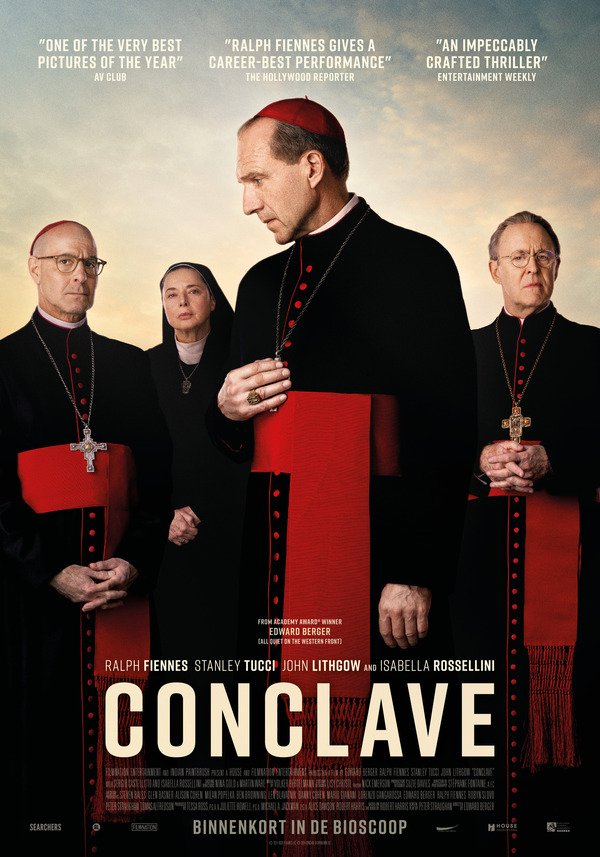Midnight Mass 2024: Isaiah 52:7-10, Hebrews 1:1-4 and John 1: 1-14
The power of God. The ambition of men.
The pope is dead. The throne is vacant.
What happens behind these walls will change everything.
Taglines for the film “Conclave”. Based on a novel by Robert Harris, it's been praised for its cinematography and stellar cast - led by Ralph Fiennes, Stanley Tucci and Isabella Rossellini.
It’s a suspenseful, glossy thriller; dark and claustrophobic.
The themes are familiar: ambition, temptation, conspiracies and corruption; but also humility, courage, growing self-awareness; moments of repentance and forgiveness.
It names the impact of grief, the nature of friendship, and the longing for hope.
In his address, Cardinal Lawrence speaks from the heart saying: There is one sin which I have come to fear above all others… certainty. If there was only certainty, and no doubt, there would be no mystery. And therefore, no need for faith.
Sin is what separates us for each other and God. The pursuit of certainty can drive us to conspiracies and erode our capacity to trust or understand others. It’s elusive, brittle and divisive. An enemy of unity and of tolerance, as Cardinal Lawrence puts it.
Certainties are shaken by the sorrow of death, the joys of friendship and commitment to a better future. Doubt, mystery and faith are our companions in these things.
Birth also shakes and undoes certainty. The wonder of first breath; the dignity, vulnerability and possibility of a life unfolding in unknown ways.
The birth we mark this holy night is a mystery calling forth faith - tenderness and hope. A mystery of love which exceeds our imagination; the eternal one, who holds our lives, dwells with us.
The writer of the letter to the Hebrews reminds us of how God spoke through prophets, calling us to do justice, seek mercy and walk humbly with our God.
We don’t need a conclave to reveal either how our motivations or ambitions fall short of that; or how precious is our humanity, how tender our grief, how restless our longing for hope.
In response, God chooses to reveal Godself by dwelling with us: the glory of the creator’s very being, the sustainer of all things, comes to us in wordless infancy.
This child grows into adulthood - healing, consoling, teaching, debating, feeding, welcoming. He overcomes the old certainties of our misdirected hearts by bearing the weight of that sin and strife in his own body.
The power of God - in vulnerability.
The ambition of men - undone.
There is a death, yes; but in him life is restored.
What happens in him - in the world, not behind closed doors - changes everything.
The Word that was with God and was God became flesh: lived among us.
The Word brings life and light. Light that enlightens, that shines in the darkness.
Darkness did not, has not, will not overcome it.
Light. Not certainty. Light.
Light breaks down certainties and awakens possibilities.
At the end of “Conclave” windows open and light breaks in, dispelling claustrophobia. There is air, breath and laughter. Light.
We cannot retreat from the world in its beauty and brokenness, but we can seek the light - by refusing despair, resignation and indifference.
Light opens us to the mystery of the other - resisting suspicion, division and suffering; not allowing hate to creep into our hearts.
Dare we let light shape our imaginations - affirming what is good, binding up broken hearts, persevering in love for the sake of a renewed world
In dark times of tragedy or sorrow, we can turn to the light. We can hunger and thirst for righteousness, seeking what is just, beautiful, good, true - even joyful.
This week, in one of the world’s darkest places, the Jerusalem Patriarch said to Christians in Gaza: ‘you have become the light of our church in the entire world’.
He spoke of joy in being present with them; of love and solidarity; of the need to protect their hearts - in light and love and life - in order to be ready to rebuild.
In the darkness we might ask ‘where is the light?’. John reminds us that Jesus is our light and life, our hope and joy.
In the darkness of this night, this world, we receive him. Emmanuel. God with us.
We receive him in the candles we light, the crib we bless, the forgiveness breathed on us; we receive him in the peace we share, the bread we break, the wine we pour out and in being with each other.
We receive him in being blessed to be a blessing of light to others: to be messengers of the good news of joy and comfort, healing and renewal.
May the light of Christ kindle a hopeful flame in us - flames of hope and joy, mystery, faith and love; undoing certainty, dispelling darkness. Amen.
© Julie Gittoes




